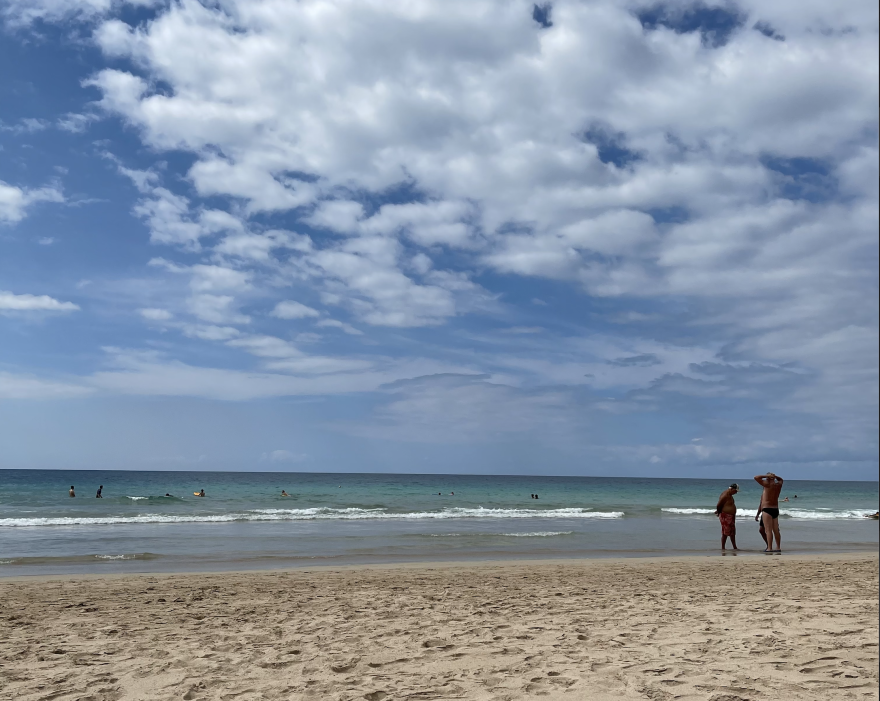The tourism industry in Hawaii has been severely impacted by pandemic travel restrictions and on a bit of a rollercoaster ride, though with more losses than gains overall for the island state’s most important economic driver.
The lifting of restrictions set for Nov. 1 means more tourist dollars could soon be flowing into Hawaii’s economy again, just in time for the holiday season, but there’s still a lot of uncertainty and a lot of damage that’s already been done.
Hawaii Public Radio’s Casey Harlow has been covering the COVID-19 pandemic’s effects on the state and says many out-of-work or under-employed tourism industry workers are hopeful things turn around soon.
Listen here:
The following transcript has been lightly edited for clarity.
Casey Grove: So take us back, what have the ups and downs, the back and forth of travel restrictions been like for tourism in Hawaii during the pandemic?
Casey Harlow: Well, it's been a roller coaster, as you said. 2019, we had a record-breaking year as far as tourism: $17.75 billion was created. And so when 2020 happened, all that came to a complete stop. Here's a couple numbers. In July 2020, compared to July in 2019, it was a 98% drop in visitor arrivals. And to put it into a little bit more context, a little bit more broader, you know, 995,000 visitors in 2019, compared to 22,000 visitors in 2020. So, it's been very bad for our tourism industry. And now that we're in 2021, when restrictions were eased for a bit around sprig break time — around March or April — we were seeing another boom. It was great to see visitors come back to the islands. But, unfortunately, August started turning around because the delta surge was happening here in the islands. Governor David Ige announced that if you don't need to come to Hawaii, please don't because our hospitals were being overwhelmed at that point. And it came to a complete stop again.
CG: What are people in the industry telling you about how the pandemic downturn has affected them?
CH: For hotel workers, either one of two options: They've been furloughed again or they're getting their hours severely cut down. Maybe, you know, 20 hours, when they would normally have 40 hours and a full-time job and benefits. It's really sad because with federal assistance that we would normally have had with the pandemic, that's are gone now. So these people are struggling to make ends meet.
CG: So I guess it's safe to say that people are very interested in more tourists coming back to Hawaii. Where are we at now, though? Is there any reason to be optimistic?
CH: Yes, there are a lot of reasons to be optimistic around this time of year, especially with non-essential travel reopening. That is happening effective Monday, Nov. 1. It couldn't have come at a better time because we're entering what traditionally is a really busy season for tourism here. But a report from some economists here at the University of Hawaiʻi did note about a month back that tourism may be slower rebounding. But who knows, there's a lot of optimism, a lot of anticipation that when non-essential travel opens up again, that people will still come to the state and still spend dollars and that will result in hotels hiring back their workers and giving the workers that are still working more hours. And we'll just have to see what happens from here.
CG: So, Casey, you're from Hawaii. I'm from Alaska. And it really seems like our states share this certain kind of kinship, especially in terms of, you know, people from here — a cold place — wanting to visit a warm place, and maybe vice versa. Why do you think that is? Why do we have that connection?
CH: Maybe it's because we're the 49th and 50th states and there's some sort of kinship or not connected to the continental US within those borders. But residents love Alaska, because I guess it's the total opposite of Hawaii. Residents love the cold and there's, you know, we share obviously some animal species and we have a lot of nature lovers here in the state. Also fishing is like a huge deal here as well. Residents love to fish and we love salmon. So a lot of people go up to participate in salmon fishing in Alaska as well. But yeah, I think it would be more of maybe the warm weather attracts Alaskan residents and the cold weather attracts Hawaii residents.
CG: An exchange program of sorts.
CH: Yeah, exactly.
CG: And then when you have people who share the same name, of course, is always a bonus.


